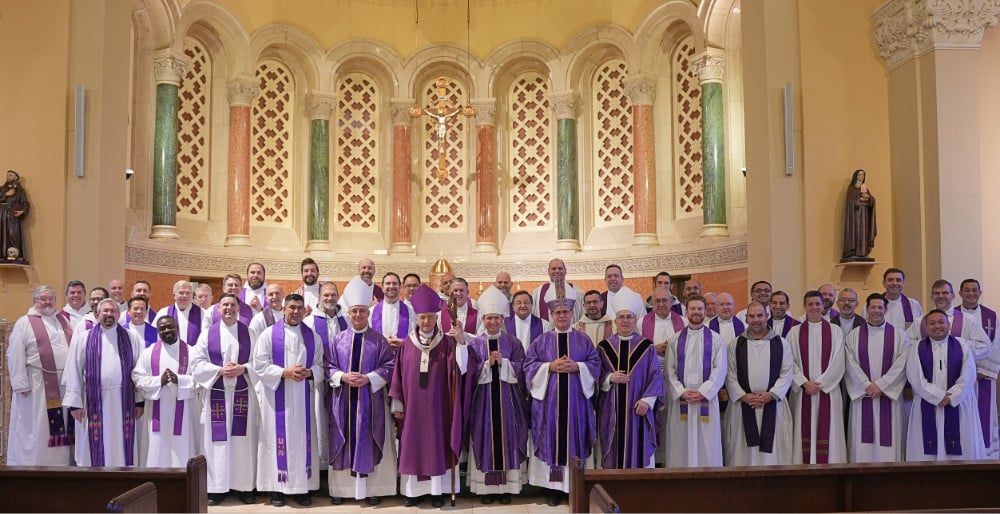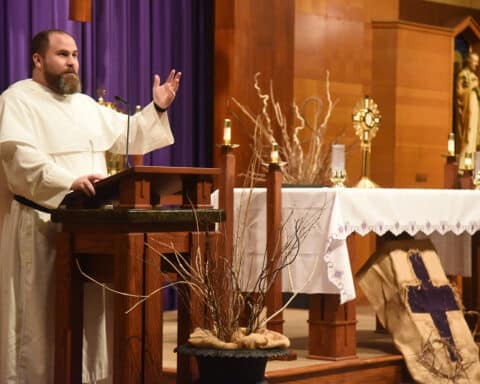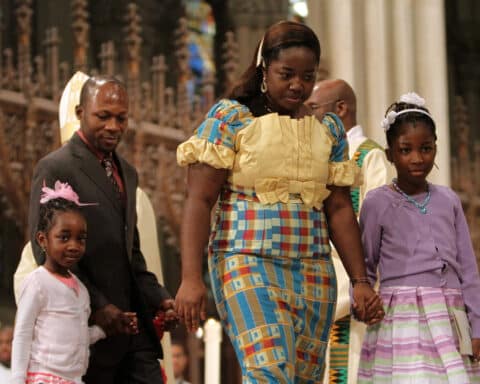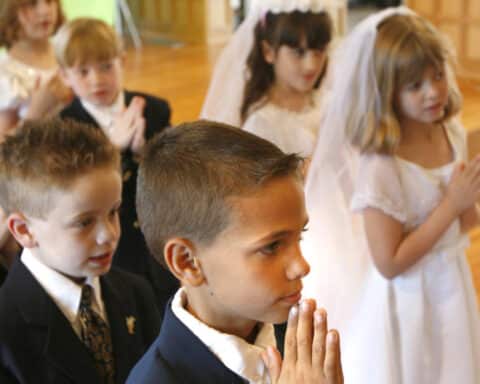American Catholic bishops are sending out their top preachers to carry the message of the National Eucharistic Revival to dioceses and local parishes across the country in order to awaken Catholics to the Real Presence of Jesus that awaits them at Mass.
The U.S. Conference of Catholic Bishops will launch the grassroots revival on the feast of Corpus Christi on June 19, convene a National Eucharistic Congress in 2024 and conclude their effort to show the faithful that Jesus lives in the Eucharist on Pentecost Sunday in 2025.
“The fruitfulness of our Church’s mission to evangelize is intimately bound up with the belief of Jesus’ True Presence in the Eucharist,” said Sister Alicia Torres of the Franciscans of the Eucharist in Chicago. “When we evangelize, we proclaim a Person, Jesus Christ, and his Gospel. The only way to do this authentically is to know Jesus, and to be known by him. The most profound way we can grow in intimacy with the Lord Jesus on this side of heaven is through the Eucharist — at Mass, in Communion and in adoration.”
The National Eucharistic Preachers gathered for a retreat in fraternity and prayer at the Mission of Our Lady of the Angels on the westside of Chicago earlier this year that was truly “pentecostal,” said Sister Alicia, who helped plan the retreat has been instrumental in the formation of the National Eucharistic Preachers initiative.
“The Real Presence of Jesus was experienced in a powerful way at Mass, where Christ’s sacrifice is daily renewed, and in the profound silence of Eucharistic adoration,” Sister Alicia said. “The priests not only looked inward with Jesus, but also outward toward Jesus as they encountered him in the Eucharist, and then in each other and in the poor, whom they took time to love and serve during the retreat.”
In launching the revival, the American bishops said they believe that God wants to see a movement of Catholics across the United States — healed, converted, formed and unified by an encounter with Jesus in the Eucharist and sent out in mission “for the life of the world.”
The 46 selected priests represent a diverse cross-section of dioceses and religious orders in the United States who span a variety of years in the priesthood, ministerial experience, ethnicity and culture. Their number is expected to grow during the four segments of the revival, which are:
-
- The Diocesan Year of Eucharistic Revival from June 19, 2022, to June 11, 2023.
- The Parish Year of Eucharistic Revival from June 11, 2023, to July 17, 2024.
- The National Eucharistic Congress from July 17 to July 24, 2024.
- Year of Going Out on Mission from July 17, 2024, to Pentecost 2025.
“Being a Eucharistic preacher is first an opportunity for me to continue growing in love and unity with Christ truly present,” said Father Luke Spannagel, pastor of St. Mary of the Immaculate Conception and Sacred Heart Parishes in Rock Island, Illinois, in the Diocese of Peoria.
“This is a calling for me to strive to live more and more deeply united with Christ and centered in Christ throughout each day. This is a calling to joyfully share the gift of Jesus truly present that we have been given. For many, hopefully, the preaching will be a reminder of the gift that has always been present … for others, hopefully, will foster an encounter with Christ that will begin a true friendship in him.”
In the first year of the revival, only dioceses are able to request a National Eucharistic Preacher for diocesan-level events at “minimal to no cost to the diocese,” Sister Alicia said.
Further information can be found at EucharisticRevival.org/eucharistic-preachers. Diocesan leaders delegated by their local bishop will coordinate the revival in their diocese and have access to request preachers for diocesan events during the Diocesan Year in 2022. Parishes will be able to request a preacher through the website as the Parish Year of Eucharistic Revival nears in 2023.
“I am excited to be a part of a renewal in Eucharistic faith and devotion in the Church in this country,” said Father Connor Danstrom, a Eucharistic Preacher who is director and chaplain of the St. John Paul II Newman Center at the University of Illinois at Chicago. “I have seen how love of Jesus in the Eucharist, lived out in simple and faithful ways, can enliven a parish or a college campus. I can only imagine what kind of fruit God can bear in us if our cities or even our entire country turns to him in faith and allows the grace of the Eucharist to penetrate our hearts.”
Eucharistic preachers will lead gatherings for diocesan and parish leaders, preside at diocesan Masses and Eucharistic Holy Hours, clergy convocations, diocesan Eucharistic congresses and youth and young adult events.
“The preachers will affirm the great work done in the dioceses by clergy and lay faithful,” Sister Alicia said. “Dioceses around the country will be invited to identify local preachers — both ordained and lay — who can help multiply the efforts of the National Eucharistic Preachers on a local level to amplify the impact of the revival.”
Father Joseph Jean Louis, associate pastor at Sacred Heart Parish in the Archdiocese of Miami, said: “To be a Eucharistic preacher means that I’m committed to continue to live a Eucharistic life, a life patterned after Christ. (It) means to be able to talk openly about the meaning of the Eucharist and when we receive the Eucharist, we receive the body and blood of Jesus Christ and his love and sacrifice for our salvation. As the source of our faith, our hope and our love as Catholics can be found in the Eucharist.”
Father Louis added: “I hope the National Eucharist Revival will bring more hope to the Church and more people will embrace Jesus with faith in devotion within the Catholic Church. The Eucharistic Revival can be a key element in the renewal of the Church.”
Father Jorge Torres of the Diocese of Orlando, Florida, and staff member dedicated to the Eucharistic Revival at the USCCB, asserted the Revival, “is an invitation from the bishops of the United States to ignite our faith in the Eucharist in a way that flows from and returns to the Eucharist.”
Father James Mason, outgoing rector of Kenrick-Glennon Seminary in St. Louis, has long accepted Christ’s invitation and relishes his selection as a preacher.
“He draws me to be with him. Ask for the gift to desire to be with him. That is all he wants,” Father Mason said. “To be with him in the Eucharist is to be with St. John at the Last Supper, hearing his heartbeat, again and again, ‘Love and Mercy, Love and Mercy’ … I do not know about you, but I need that.”
The Eucharistic preachers’ dedication to the revival is captured by a comment by Jesuit Father Paul Shelton, regional vocation director for the Midwest Jesuits. He said: “I am excited by its missionary aspect. The revival hopes to unite, inspire and renew American Catholicism by putting us in contact with that which matters most: Jesus. I could think of no better way of serving the Church and helping it than by sharing my own love for the Eucharist as a preacher.”
The Eucharistic Revival also aims to increase awareness of the importance of all the other sacraments, Father Torres said.
“When one sacrament is undervalued, all sacraments are undervalued,” Father Torres told Our Sunday Visitor. “When one sacrament is lifted closer to its God-given dignity, all sacraments are raised to their God-given worth. The challenge here is not the value of the sacrament but the human ability to perceive it. The more the human heart receives from one sacrament the more the rest will be fonts of grace for the person, the Church, and humanity.”
Father Torres said that the Sacrament of Penance is essential to reception of the Eucharist, and, he said it is an essential dimension of the Revival. … A beautiful method for revisiting proper disposition in receiving the Eucharist is given when we approach the altar to receive Communion; we are saying by our actions that we are already in communion with Jesus, his Church and one another.”
Joseph R. LaPlante writes from Rhode Island.





